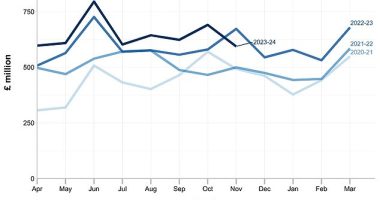OLDER Brits could see their state pension increase by 3.1% next year.
The inflation rate, announced today, is usually used to work out how much the state pension will rise by, and it currently reveals Brits could take home an extra £5.50 a week.
The state pension amount is calculated using the triple lock formula.
The triple lock sets an increase to weekly payments based on the higher of three things: average wages, the consumer prices index (CPI) or 2.5%.
Here we explain how much you could get when it rises next April.
The state pension is a weekly payment from the government that is given to men and women aged over 66.
It is due to rise to 67 by 2028 and 68 between 2037 and 2039.
The payments are changed each year using the triple lock to ensure that pensioner spending power remains in line with the cost of living.
Though scrapping the earnings element of the state pension triple-lock means retirees missed out on a blockbuster 8.3% increase this time around.
They are set each Autumn, typically in September and paid from the start of the following tax year in April.
How much is the state pension?
The state pension is currently £179.60 per week.
That means you could get £9,339 from the government to top-up your income during the year.
The actual amount you receive will depend on your national insurance record.
The full £179.60 state pension is only paid to those with a minimum 35 years national insurance contributions.
You need a minimum of 10 years national insurance contributions to get any payments.
It is possible to make voluntary national insurance contributions to top up your record, usually from the previous six years.
How much will the state pension increase by?
The state pension is set to increase by 3.1% in 2022/23, in line with the inflation figures released this morning.
That means pensioners are set to receive a boost of a little more than £5.50 a week – around the cost of a bottle of supermarket wine – to their weekly incomes from next April.
Broken down, the basic state pension will go from £137.60 per week to £141.85 per week.
While the flat-rate state pension will rise from £179.60 per week to £185.15 per week.
Forecasts from the Office for Budget Responsibility have previously suggested that the triple lock could mean pensions rise by as much as 4.6% next April.
That’s based on wage growth in the coming months as lockdown restrictions ease.
But The Bank of England then suggested it could be as much as an 8% rise.
But the Government’s decision to suspend the earnings element of the state pension triple-lock means retirees will miss out on a blockbuster 8.3% increase.
Tom Selby, head of retirement policy at AJ Bell, said: “This decision will ‘cost’ someone in receipt of the full flat-rate state pension £9.35 a week in retirement income – or £486.20 over the course of the year.”
The OBR also predicted that state pension payments could hit more than £200 per week over the next four years based on the benefit rising by 2.7% in 2023, 2.5% in 2024 and 2.6% in 2025.
This could be seen as expensive for the government and unfair for younger generations, many of whom have been furloughed, faced pay cuts or lost jobs over the past year.
It may also put pressure on the government to review how the triple lock is used.
We pay for your stories!
Do you have a story for The Sun Online Money team?
Email us at [email protected]









